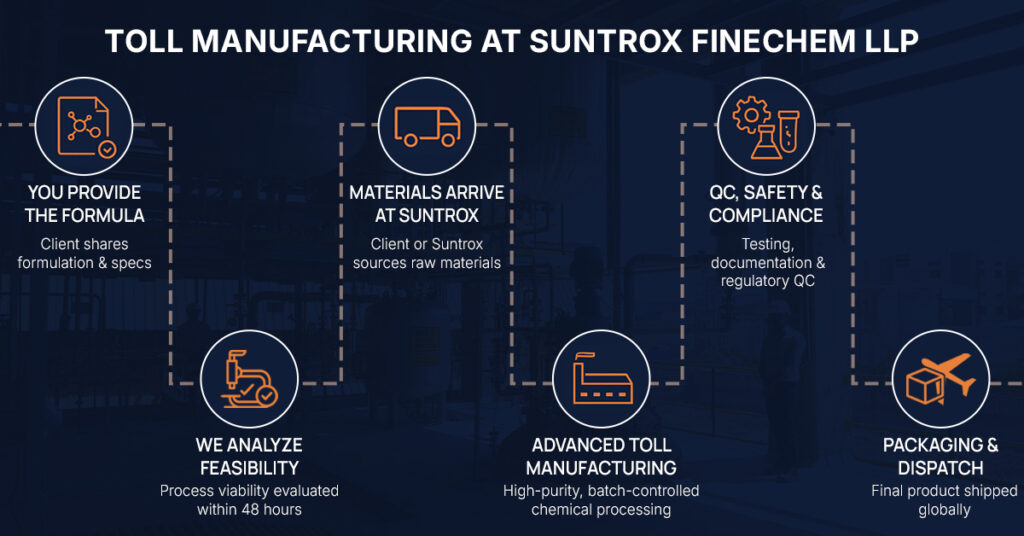Toll manufacturing is increasingly seen as a capex-free growth strategy for specialty chemical firms. By outsourcing production to contract manufacturers, companies can expand capacity without investing in new plants or equipment. In practice, this means clients simply supply the formula or raw materials and the toller runs the process – effectively leveraging the toller’s existing infrastructure.
For example, contract manufacturing allows companies to optimize production without investing in new facilities or equipment, avoiding the substantial capital expenditure of building plants. The result is built-in flexibility: firms can quickly ramp up to meet a surge in demand or trial new formulations without long-term commitments.
New entrants like Ahmedabad’s Suntrox Finechem LLP (founded 2022) exemplify this model, offering advanced tolling services as a “clean tech” specialty chemical partner
Benefits of Toll Manufacturing
- Avoiding Capital Investment: Firms eliminate heavy upfront costs. Tolling means paying only for production run-time, not for underutilized plant equipment.
- Scalability and Flexibility: Contract manufacturers can quickly adjust production levels. Tolling lets a company “ramp up production to meet a seasonal spike in demand or test new formulations without committing to long-term investments”.
- Access to Expertise: Tollers bring in-house process know-how, state-of-the-art equipment and regulatory compliance systems. Clients benefit from this specialized expertise without developing it internally.
- Risk Mitigation: Experienced tollers manage raw-material procurement and quality systems, reducing exposure to supply volatility and regulatory issues. This partnership approach effectively outsources risk, ensuring consistent product quality and timelines.
- Focus on Core Competencies: With manufacturing handled by partners, chemical companies can concentrate on R&D, marketing and innovation, accelerating new product development.
The Hidden Cost Savings of Outsourcing Chemical Manufacturing
Even beyond headline cost reductions, outsourcing chemical production delivers hidden savings and efficiencies. In-house manufacturing carries many hidden costs – equipment depreciation, maintenance, utilities, safety systems and compliance overhead. By contrast, contract manufacturers absorb these costs within their larger operations. As one industry analysis notes, outsourcing significantly lowers a company’s total cost of ownership by eliminating fixed labor and overhead expenses Toll manufacturers typically run plants at high utilization and across many products, spreading those fixed costs over higher volumes. They also implement lean practices to minimize downtime and waste. For instance, modern tolling facilities follow stringent QA and safety protocols so that processes are “streamlined and risks mitigated”, which reduces scrap and batch failures. This yields direct savings in operating budgets.
- Lower Operating Costs: Outsourcing shifts expenses like equipment maintenance, utilities, and labor to the toller. reports that partnering with a contract manufacturer can “reduce total manufacturing costs significantly when factoring in labor, overhead, equipment, and supply chain efficiencies”
- Improved Asset Utilization: Clients avoid underutilized assets. A toller’s plant is typically running multiple projects back-to-back, maximizing equipment usage. This high utilization means a lower per-unit cost compared to a single customer operating the same equipment part-time.
- Operational Risk Reduction: Tollers maintain advanced safety and control systems, which lowers the chance of costly incidents. As noted by Tapecon, outsourcing inherently “reduces operational risk” by providing redundancy and broader supplier networks. Likewise, specialized toll facilities often have robust process controls and experienced staff, ensuring high-quality output with minimal waste
- Faster Time to Market: A fully equipped contract plant allows immediate production without construction delays. Clients can start manufacturing as soon as processes are transferred, improving cash flow. Immediate access to production capacity translates into quicker revenue realization and returns on development investment.
By pooling resources, toll manufacturing turns unused capacity into value and shrinks many hidden overheads. Well-known contract plants are essentially turnkey solutions: they are fully built and certified, ready to produce clients’ chemicals on demand. This “plug-and-play” model (exemplified by facilities like Suntrox’s) means the client’s only outlay is the cost per batch – a sharp contrast to the sunk costs of building a new plant.


